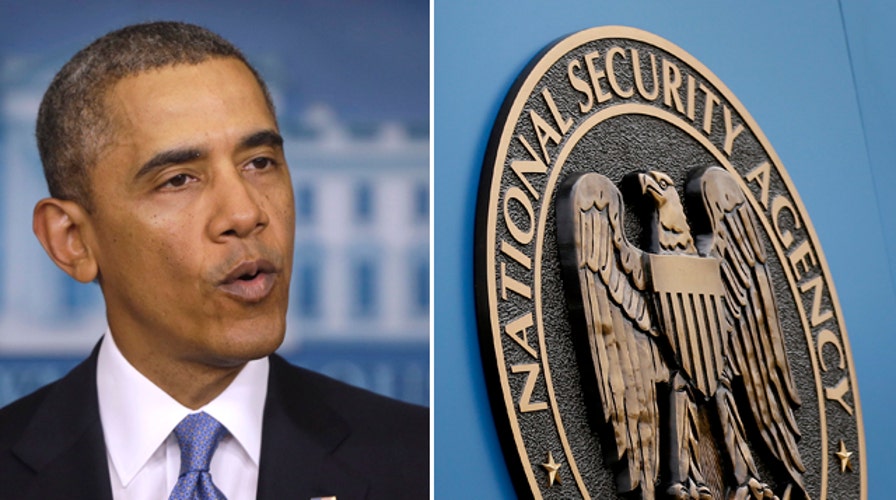Obama to call for end to NSA bulk data collection
President expected to unveil overhaul of data policies
President Obama is calling on Congress to pass new legislation that would prevent the National Security Agency from collecting and holding vast amounts of data on Americans' phone calls.
The president discussed the plans during a press conference at The Hague in The Netherlands. Previewing his proposal, he claimed it would address concerns about how the bulk data collection could be exploited.
"I'm confident that [the proposal] allows us to do what is necessary in order to deal with the dangers of a terrorist threat but does so in a way that addresses some of the concerns that people have raised," Obama said.
The New York Times first reported late Monday that the administration was expected to propose that Congress overhaul the electronic surveillance program by having phone companies hold onto the call records, according to a government official briefed on the proposal.
The proposal would require that phone companies only keep the records for the 18 months currently required by federal law and allow the government to see certain records when the request is approved by a federal judge. Currently, the government holds onto those phone records for five years so the numbers can be searched for national security purposes.
A senior administration official told Fox News that the president would present "a sound approach to ensuring the government no longer collects or holds this data, but still ensures that the government has access to the information it needs to meet the national security needs his team has identified." The official also said that until the legislation is passed by Congress "the president has directed his administration to renew the current program, as modified substantially by the president in his January speech."
In January, Obama tasked his administration with coming up with an alternative to the current counterterrorism program and suggested that the phone companies option was the most likely. However, he also said that option posed problems.
"This will not be simple," Obama said. An independent review panel suggested that the practice of the government collecting the phone records be replaced by a third party or the phone companies holding the records, and the government would access them as needed.
"Both of these options pose difficult problems," Obama said in January. "Relying solely on the records of multiple providers, for example, could require companies to alter their procedures in ways that raise new privacy concerns.
And the phone companies have been against this option, as well.
In several meetings with White House staff since December, phone company executives came out strongly opposed to proposals that would shift the custody of the records from the NSA to the telecoms. The executives said they would only accept such changes to the NSA program if they were legally required and if that requirement was spelled out in legislation.
The companies are concerned about the costs of retaining the records and potential liability, such as being sued by individuals whose phone data was provided to intelligence or law enforcement agencies, these people said. The discussions with the White House ceased earlier this year. Industry officials said they had not been in contact with the administration as new options were being considered. The executives have continued to discuss the issue with lawmakers, however.
Details of the government's secret phone records collection program were disclosed last year by former NSA systems analyst Edward Snowden, outraging privacy advocates and forcing Obama to promise that changes would be made.
But the White House's proposed changes won't happen right away. The government plans to continue its bulk collection program for at least three months, the Times said.
But it's unlikely that Congress would pass legislation in the next three months, as the NSA surveillance has proved to be a divisive issue, even within political parties.
The chairwoman of the Senate Intelligence Committee, Dianne Feinstein, has advocated for the program to continue to operate as it does. The California Democrat said she would be open to other options if they met national security and privacy needs.
It is unclear whether the White House proposal will meet those needs.
Leaders of the House intelligence committee are expected to introduce legislation Tuesday that would call for a similar option to the Obama administration's.
Under the administration's pending legislative proposal, officials would have to obtain phone records by getting individual orders from the Foreign Intelligence Surveillance Court, the Times report said. The new court orders would require companies to provide those records swiftly and to make available continuing data related to the order when new calls are placed or received.
The Associated Press contributed to this report.





